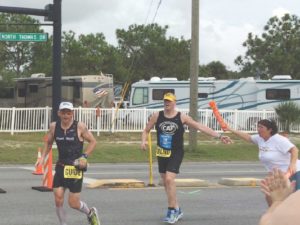This week, we had the privilege of catching up with Erich Manser (Littleton, MA.) Erich works in the tech world, helping to develop new technology for the Visually Impaired. He also is the current world record holder for the Iron Man in the Blind/ VI classification!
1. Can you give a little bit of background on yourself?
Sure! I’m 44 now and live in Littleton, MA (40 minutes West of Boston) with my wife and our 2 daughters. I grew up in a small town in North Central MA, on the NH border, and went to college in Boston at Northeastern University, where I studied Psychology. I never quite knew exactly what I wanted to do for my career, and when I got out of college, I took a job doing inside sales at a large technology company. Because of my own experience losing vision, I also began volunteering as an accessibility tester for that company, and soon realized the vital importance of that aspect of technology, which led me to learn more and become an ambassador and public advocate for technology that can be used by everyone. Over time, this has given some unique opportunities to work with technology companies, large and small, on ways for making technology solutions that are more inclusive of all people.
2. You’ve done a lot of races and used a lot of different methods and technology. What has worked best for you? A guide? The Aira glasses? What hasn’t worked?
The fact that my vision continues to change forces me to stay pretty flexible and keep an open mind. What works well one day is always subject to change, and may not work well the next day. For many of my early marathon runs, I was running solo, but getting directly behind unsuspecting strangers whom I would just follow single-file, close enough so others wouldn’t get between us, so they would be guiding me without having any idea they were doing it. When I first did a triathlon in 2010, the rules for visually-impaired required you to race guided (a tandem bicycle kinda required it too!), which gave me my first taste of the many benefits of guided racing (knowing my pace, mile markers, water stops, etc) As I got more in to triathlons, racing with guides was clearly safer and better, especially as my vision has continued to decline, so that there really was no going back.
3. Do you have a favorite race that you’ve done? Any that stick out as particularly memorable? What does your race schedule look like in the upcoming months?
Well, any race where I’m fit and healthy enough to reach the starting line is an automatic favorite, but a few that stick out for me are “my hometown race” Boston Marathon, as it’s such a major event every year and when running as part of Team With A Vision, it’s such an amazing weekend and such an incredible team – 2014 was especially memorable, as not only was I guided by TWAV guide NPR’s Peter Sagal, but we were clearly “reclaiming our race” after the bombings the year before. Similarly, CIM (California International Marathon) every December out in Sacramento (USABA National Champs for b/vi marathon) is always a wonderful weekend and incredible race, as well, where blind/vi runners enjoy an amazing VIP experience and develop lasting friendships. Other major highlights have also been completing 2 Full Ironman races, and having the distinction of exceeding the then-Blind world record each time I raced. Most recently was earlier this month, so I am currently on a bit of a training & racing break until early 2018. <SMILE>
4. What general advice would you give folks who are newly VI?
In general, I would encourage them to be patient with themselves and take the time needed to better understand changes they’ve experienced. We live in an incredible time, and the implications of vision loss are not nearly what they once were, and there are so many incredible people, resources and technology out there to help make life easier. Never be afraid or ashamed to ask for help, as there truly is no shortage of kindness in the world.
5. What advice would you give VI folks who are new to running?
Take your time, and (literally) walk before you run. Figure out the method or techniques that work well for your particular needs, and your particular state of vision. Talk to others, and network, find local, virtual or global groups where others are sharing experiences and best practices. It’s easier than ever to stay off the couch!
6. Do you have any short/long/ life goals? If so, what are they?
I have hoped to race the Kona Ironman World Championships in Hawaii, and there remains what seems like an outdated practice of physically challenged athletes not qualifying for these championships based on performance like other athletes, but only by luck of the draw. I continue to try and lend my voice and build support for discussions aimed at updating this practice. As para sports in general continue to grow in numbers, participation and popularity, practices where athletes of differing abilities are treated differently for any reason will have no place in mainstream athletic events.
7. What sort of things are on your bucket list?
Kona Ironman, buy a driverless car
8. Anything else you’d like to tell the para community?
It’s far more important to get to the starting line than the finish line. Try never to feel discouraged about how you look or your level of ability, because the act of simply competing leads to transformative, life-changing, unexpected things.

